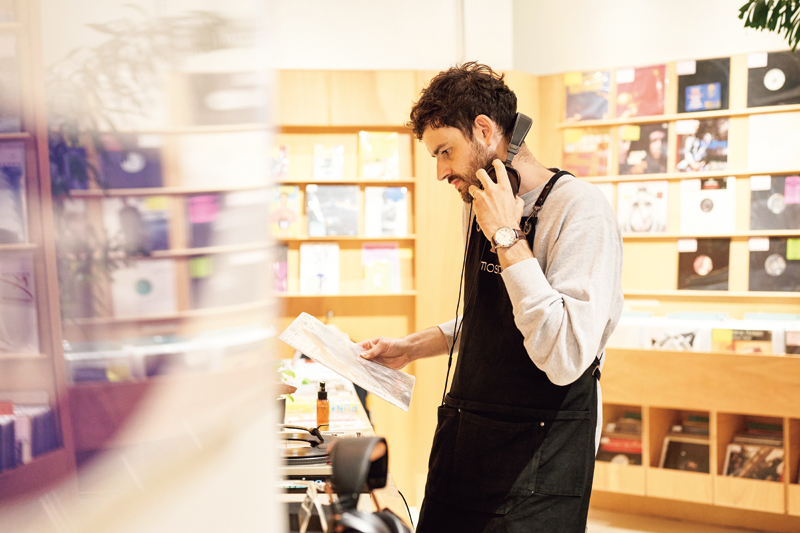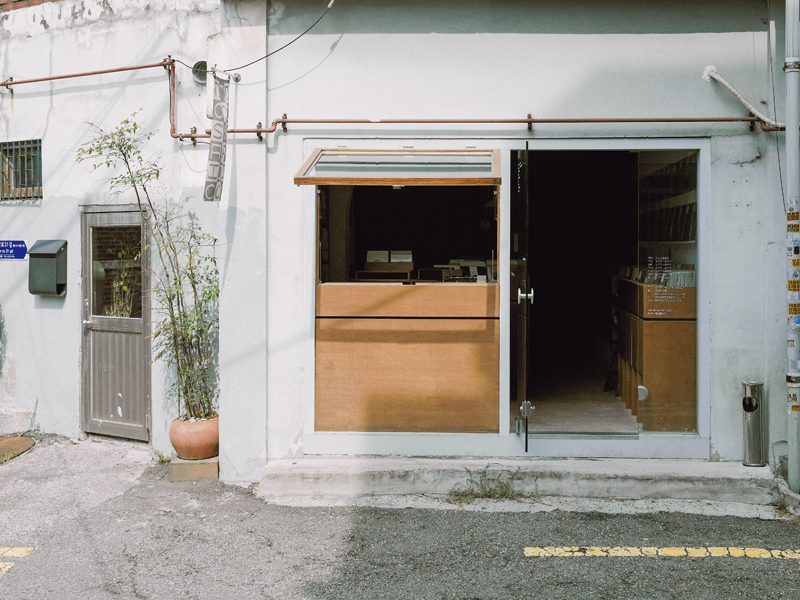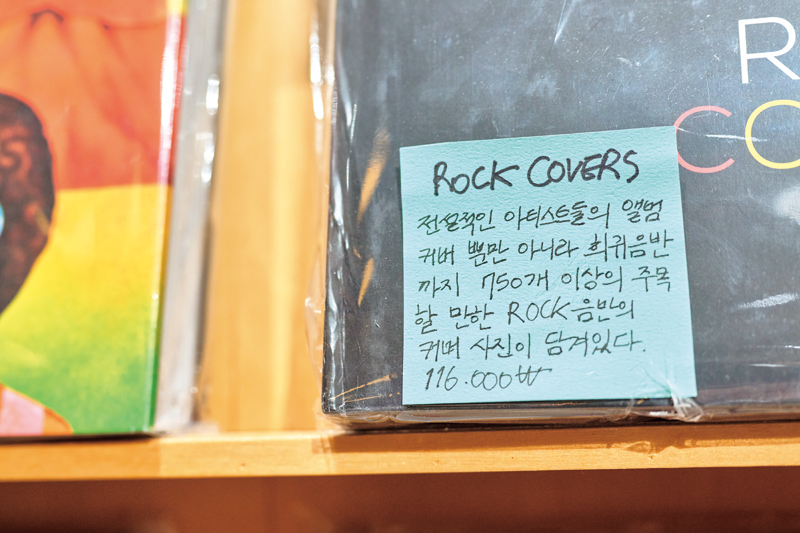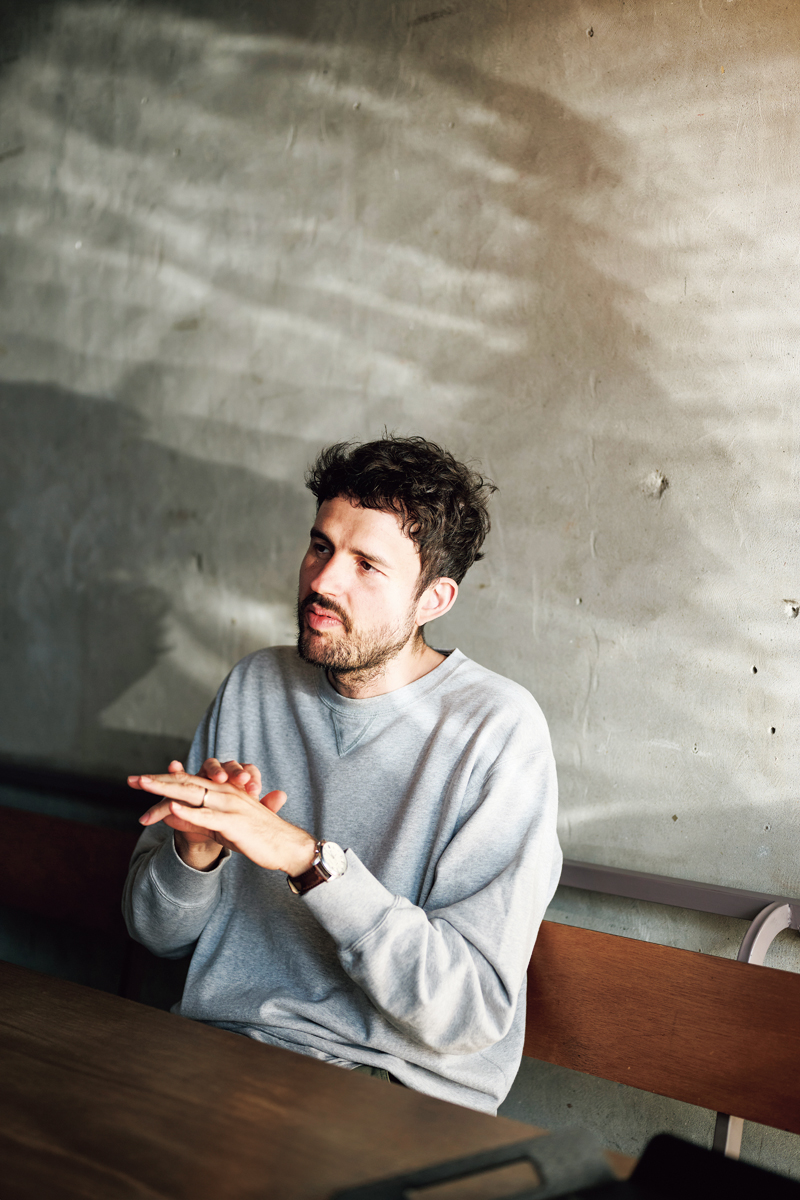Buoyed by an adventurous spirit, Curtis Cambou set off for a university exchange program in Korea. Little did he know that 12 years later, he would be overseeing two music labels, be married to prominent Korean musician Park Ji-ha, and own two popular secondhand record shops.

Curtis Cambou listens to an album at Mosaic West, his second vintage record shop, near Sangsu Station in Seoul’s Mapo District.
In today’s digital era, music lovers can effortlessly stream their favorite songs on platforms like Spotify, Apple Music, or YouTube Music. But there is a global vinyl revival in motion, and it doesn’t seem to be slowing anytime soon. In the United States, which has the largest music industry in the world, vinyl albums outsold CDs last year, according to the Recording Industry Association of America. From global pop stars to Korean contemporary musicians, artists are releasing albums on vinyl, and the younger generation is driving LP sales.
Curtis Cambou, who operates two vintage record stores in Seoul, is no stranger to the trend. Originally from Nice, France, he left his hometown at the age of 17 and went to Paris. When he decided to move on and explore the world, he ruled out cities like New York and Tokyo and chose Seoul, the name on his list that was least familiar to him. Cambou arrived in 2012, and after finishing his initial exchange course, he stayed on to study business at Korea University.
Cambou’s business instincts turned out to be musically driven. Over the years, the music lover forged connections with people in the secondhand record industry, while also growing the size of his record collection. In 2020, he opened Mosaic, his first vintage record shop, in a back alley of Sindang-dong, near Gwanghuimun, the southeast gate of the old Seoul City Wall. Cambou chose the spot before the neighborhood became so trendy. Following its success, he started an online shop, before opening his second brick-and-mortar store in Hongdae last year. Deeply motivated by a desire to promote talented Korean artists who lack distribution channels abroad, he started Braindance Records to produce albums by Korean electronic artists, and Daehan Electronics, which reissues old records and releases new albums by local artists. They were “almost lost to the hands of time before being rescued,” says Cambou. When he isn’t busy managing the shops, digging for records at flea markets, or sorting through the thousands of records that arrive at his office week in, week out, Cambou engages in his long-time hobby, DJing.
When did your love for music start?
When I was young, my mom had records and CDs and I looked for music all the time. Getting some mixtapes from friends, she would listen in the car. She was big into soul […] There was a lot of British synth pop — stuff like Depeche Mode or The Human League.
Did you favor a particular genre?
I listened to a lot of hip-hop when I was young. At home, we listened to mostly soul, so classic Bill Withers, Marvin Gaye, Sade, and stuff like that. And then I started getting into psychedelic. It just went from this and that. I would have a phase for a year or six months where I listened to only that [genre] and then move on to something else. When I arrived in Korea, I was really interested in avantgarde, experimental, and electronic music — stuff that was a bit out there.
What made you stay in Korea?
It is hard to pinpoint one thing, but I found my role in society here. I felt like the music industry here was a blue ocean for me. I can help people in a way and people help me. You can get into the society in your own way and naturally, you find a way to stay.
What did you do after graduating?
I worked for Hyundai Card in the space marketing team and they moved me to Hyundai Music Library, where I was taking care of the record collection as the assistant manager.
How did you get into record labels?
Around me there were a few guys that really had the level that deserves a release abroad, but no label from Korea distributes them abroad [because] they don’t have contacts. They have contacts for the major companies, but the underground circuit is totally different. I had quite a lot of connections with distributors and record label owners, so I just decided I would release and distribute — so producing in Europe, distributing in Europe.
What has been your most memorable project?
My best project was a band called Puredigitalsilence [PDS]. Their music is really outstanding and when I met them, they hadn’t done any concerts for ages — just a couple of guys still in the noise experimental scene. So, we gathered them again and had a well-made release. We remastered an amateur documentary of them made by a student back in the late 90s. We translated everything into English and got a projection and we got them to play live for the first time in twenty years. So many people showed up we sold out. It was a big bet for me, but it was one of the best days of my life.
What was the response outside Korea?
I had so many people, particularly Korean Americans, contacting me saying thanks. Most of them cannot really speak Korean, but they all told me the same thing. They feel like they have Korean roots but they want to feel like there is an alternative scene in Korea — a community for things other than just the mainstream.
How did you transition to running a vintage record shop?
I was supposed to release a second album of Puredigitalsilence but at the time, COVID started and the big issue was shipping costs. We would lose too much money to have it sent to the distributor. I had changed from my job at Hyundai Card and had a small job to help me while I passed through the Korean integration program to switch to a resident visa. I did not have enough to invest a few thousand bucks in that project. Once I got the visa, I was able to start my business, called Mosaic.

Cambou opened his first record shop, Mosaic, in a residential alley in Sindang-dong.
© MOSAIC
Why did you choose to open your shop in Sindang-dong?
I used to live in Changsin-dong, which is not far from Sindang-dong, and I needed to find a location quickly. My budget was very low and back then my wife said the Gwanghuimun area is nice. So, I went to a few budongsans [real estate agents] to ask around but they would say, “Eopseo, eopso [There’s nothing available].” I used to deal with a lot of older people and I have my techniques to make people feel a bit more comfortable. I went there many times within the next few weeks, bringing some VITA500 drinks and at some point, a space suddenly opened up. We went there and the space was not out in the retail market yet. He showed me that space and I thought that’s the one. It is super cheap and kind of charming.
Why do you think Mosaic has become so popular?
Diversity, quality of stuff, and a stable flow of new albums coming in. Once a week we have a big arrival and it is hard to find really the top, the cream, so we try to make sure everything that comes in there is very special.
What is the general age group of your customers?
It is quite broad, but those in their 20s to 40s are the majority of our customers, and by 40s we’re talking like 40 to 49.

Notes handwritten by the Mosaic staff are attached to albums and books, highlighting their content.
How do your two record shops differ from each other?
The first shop is more focused on world music. So African, Brazilian, reggae, and rare groove — American 60s, 70s, soul and funk. So that is what we are focused on with jazz. The second shop is a bit more “street” in a way. The shop has a lot of hip-hop, house, techno, disco, dance music from the 80s, most of the New York scene, and a lot of alternative rock, indie, new wave, post punk, punk metal, trash, hard rock, and a lot of rock classics as well.
What would you like people to experience in your shops?
We try to make sure people can experience the record shop themselves. It is like going to the library. You have genres that we divide very specifically and people can experience digging for records and listening to decide their own music styles.
When did you meet your wife? Do the two of you work together?
We met five years ago. I wanted to release her album but ended up not doing it. I realized her label was already doing a great job. She is quite well-known in her field. Amazon MGM studios released a film called Foe and she is on the soundtrack, and she gets invited to collaborate on a lot of projects, so I assist her with English communication for overseas work.

Cambou speaks passionately about his desire to have more people discover a wider variety of music at his shops.
What are your future hopes and dreams?
What I want is to have the secondhand record industry gain proper recognition as a business. In Korea, it is not professional. I wish to arrive at a point where my business looks like a proper corporation and we have even more shops in Korea, and young people will want to work for us.